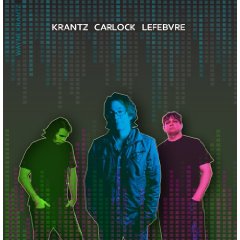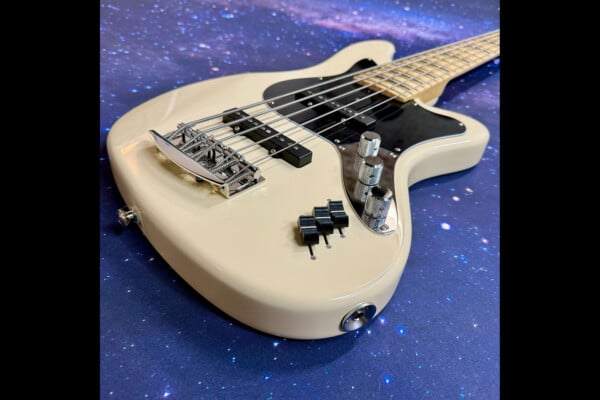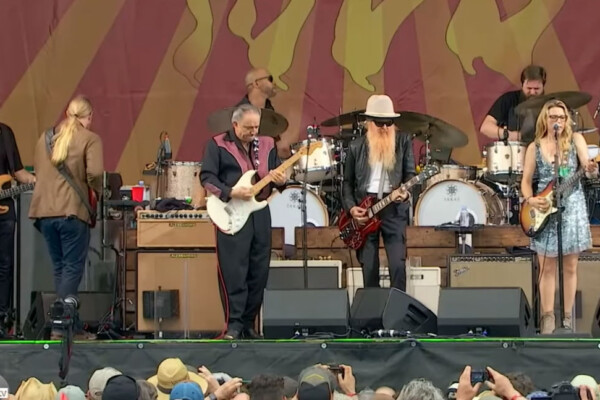A review of Wayne Krantz – Krantz Carlock Lefebvre 2009
 Krantz Carlock Lefebvre is the first studio document of a trio that has been performing together since 1997, although Wayne Krantz regularly releases live recordings from his website. It’s also Krantz’s first studio album under his own name for fifteen years.
Krantz Carlock Lefebvre is the first studio document of a trio that has been performing together since 1997, although Wayne Krantz regularly releases live recordings from his website. It’s also Krantz’s first studio album under his own name for fifteen years.
Krantz is a phenomenal guitarist, and this is a record that guitarists will reference for years to come. Krantz ia a player with remarkable technical skill and has developed a singular use of sonic effects. Where he stands out from many guitarists though is in his finely developed sense of restraint and self-editing. He’s also a musician determined to tread his own path – and this is a unique record.
It’s a record that suits playing loud and often sits between rock and fusion; but trying to assign mere genres to music by the likes of Krantz, Carlock and Lefebvre is a foolish endeavor. Krantz states on his site that he set out to make his idea of a pop record complete with vocals. The vocals are musical enough that they don’t distract from the essentially instrumental approach of the record and in fact they often add to what turn out to be a very hook-laden fusion record.
It is a trio and the drummer and bassist on this record are nothing like ordinary. I was lucky enough to review the new Rudder CD featuring these two for NoTreble and any record featuring these guys is a must to check out. Keith Carlock is a powerful force throughout on drums. His kick drum sound has to be heard to be believed. Carlock is simply one of the most exciting drummers around today. Tim Lefebvre has said before that he could play anything and sound good with Carlock’s grooves and indeed I’m sure he could, though Lefebvre plays wonderfully on this CD. Tim Lefebvre enjoys a lot of room for sonic experimentation and improvisation. Lefebvre is a wonderful bassist with a great knack of choosing wonderful bass tones and developing grooves.
There’s a sense at times that the record tries to cram a awful lot of ideas into a relatively small space. The tracks sometimes mutate quickly from one groove to another and I found myself wishing a couple more of the grooves would be left to ësteep’ for a while and develop its flavor. I also found the offhand lyrics at times contrasted with the expansive and multi-faceted music but they do add to the catchy quality of the record.
OK, the tunes:
It’s No Fun Not To Like Pop features precise grooves and interaction. There’s an intensity but slightly restlessness in the way the guitar and bass improvisations slip from one section to another as Carlock builds in intensity throughout. This tune is Krantz’s response to “the inevitable disappointment on hearing the latest hit record”. Krantz gets to rock out but as always he stays on the musical side of shred with concise solos and beautiful phrasing.
War-Torn Johnny is described by Krantz as being for a veteran returning from conflict. A metallic riff alternates with a beautiful airy groove. The three play as one, sparking off one another to become one giant mecha music creation with industrial sounds and effects blended with jazz and rock sounds. Lefebvre provides drum and bass influenced dub sounds one minute and light melodic bass the next.
Rushdie is named for the author, Salman Rushdie. It features beautiful guitar playing over light, nimble bass and drums and a great acoustic guitar solo. Then, when least expected, both the electric piles in a joyous distorted tone with wah-wah as the bass and drums increase in power. The arrangement at the ending featuring a voice as a harmony texture is delightful.
Wine is the Thread is written about the universal human experience of lifting a cup together and features a short repeated vocal melody, bass at its most soulful and bluesy guitar. Carlock makes great use of his distinctive drumming. It’s a relaxed and melodic track. Krantz takes a spiky guitar solo which mixtures chordal and single note playing. He has an awareness of sonic architecture and use effects musically throughout.
The Earth From Above starts out as a Hendrix influenced chord melody ballad with lines that the bass joins or plays countermelodies against over more restrained drums. Space is used well in this track and the music carried me with it in beautiful melodic developments of the themes. A wonderful four and a half minutes.
Left it on the Playground. On his web site, Krantz explains that a critic had once said of bassist Tim Lefebvre that his playing was so advanced he’d “left technique back on the playground”. It’s mostly improvised and it’s a great feature for Lefebvre. It begins a brief theme then a loping bass and drums groove develops with some great use of delay/echo sonic effects on the bass. Krantz supports with some effects laden sounds of his own. Lefebvre plays delightfully given the spotlight. The drums build to an incredible level of intensity and rhythmic guitar and distorted bass dance with unrestrained delight. This is one track that features improvisation at length.
Jeff Beck originates from the time Tal Wilkenfeld (Krantz played on her debut CD) told Krantz that Beck was looking for some new material. Krantz wrote this tune for Beck but never heard back. The opening features effects driven bass mewing like a mutant dinosaur while Carlock and Krantz chirp around like smaller reptiles. Lefebvre gets funky, Carlock builds and Krantz plays sweet, harmonically ambiguous fusion guitar -becoming heavier as time goes on. This tune is a delight.
I was like is described by Krantz as a kind of rant. It’s music like nothing else, pop punk style at times but alternating with carefully crafted guitar and bass figures. It features powerhouse drumming and as it develops, multi-tracked guitar wails over rocking bass and drums.
Mosley, for the writer, is a dark, melodic gem of a tune with wonderful bass playing. The groove develops from a deep envelope filtered funk groove to a rock feel to a melodic fusion feel all within a minute or so and I can’t help but feel I would have loved to have heard the funk groove at length. Still, great tune and it covers a lot of ground in 3 minutes.
Holy Joe is, according to Krantz, a response to Bush era religious extremism. It’s helpful to know that as, stripped of their context, they can come across as a little condescending. The track features industrial sounds and an intense arrangement but is featured around the brief atheistic lyric.
Rugged Individual is Krantz’s favorite track. It’s melodic and slow building with the bass playing beautifully off the guitar melody. Not for the first time, Lefebvre makes exquisite use of delay/echo on the bass.
So, all in all, a fine record and a unique one. I would recommend checking out Wayne Krantz’s website as there is a lot of content up there and it’s updated regularly. The CD is available from the Amazon.com.
Preview and download Krantz Carlock Lefebvre
Krantz Carlock Lefebvre track listing
1. It’s No Fun Not to Like Pop
2. War-Torn Johnny
3. Rushdie
4. Wine is the Thread
5. The Earth from Above
6. Left it on the Playground
7. Jeff Beck
8. I Was Like
9. Mosley
10. Holy Joe
11. Rugged Individual
Credits
Wayne Krantz – guitars, vocals
Keith Carlock – drums
Tim Lefebvre – bass




[…] Contributions so far: Rudder – Matorning (review) Linda Oh Trio – Entry (review) Krantz Carlock Lefebvre […]
[…] Krantz Carlock Lefebvre […]
[…] classic and alien, funky and beautiful, harmonic and angular. I bought the self-titled album Krantz Carlock Lefebvre and it spent weeks in the player as I listened to it over and over and over […]